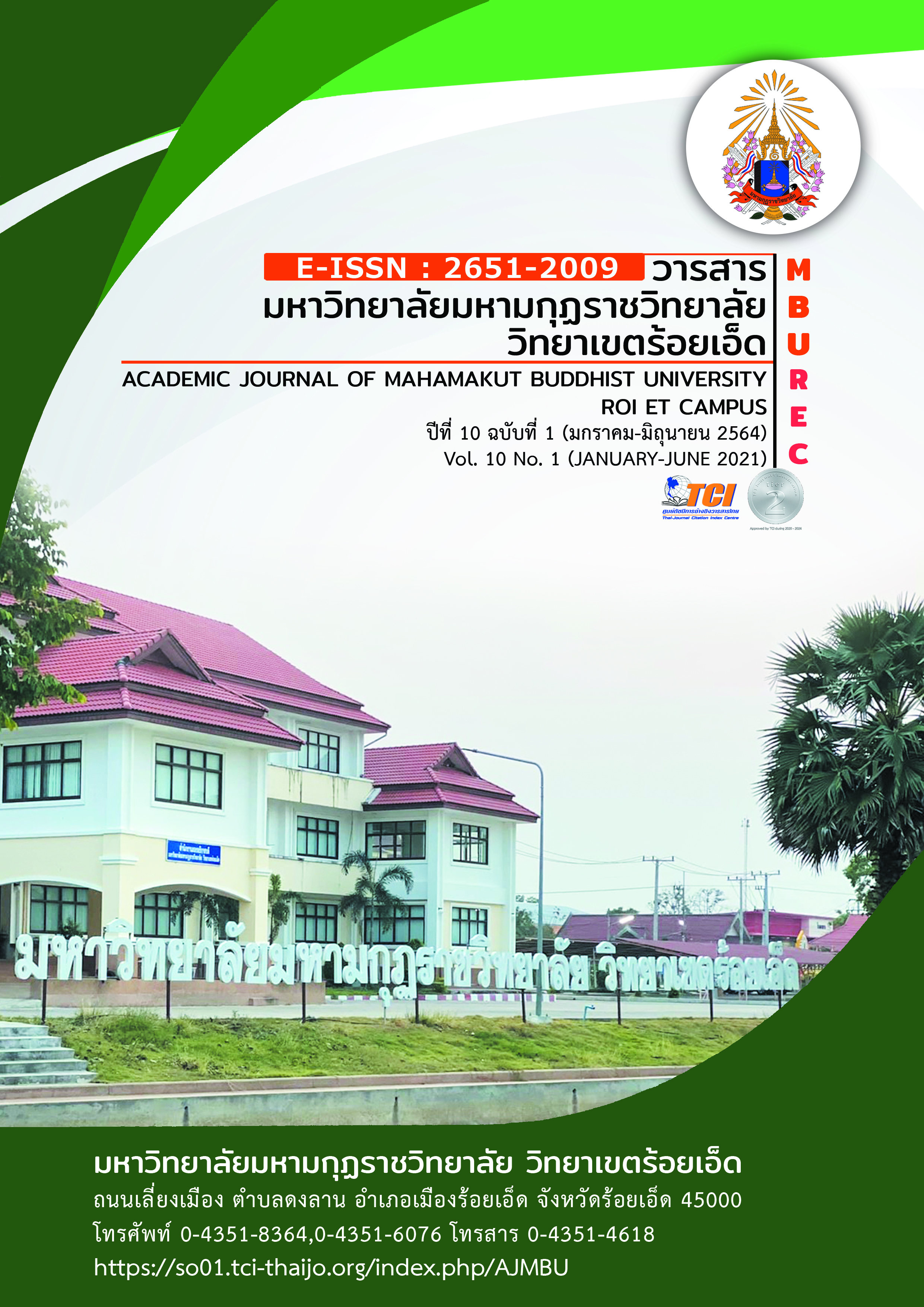Development of Word Writing Skills for Irregularly Spelled Consonant Rules by Using Brain-Based Learning Activity Management for Prathom Suksa 3 Students
Main Article Content
Abstract
The objectives of the research article were 1) to develop word writing skills for irregularly spelled consonant rules by using brain-based learning activity management for Prathom Suksa 3 students to have average score of more than 80% out of full score and more than 80% of total students passed the criteria, 2) to study satisfaction of students who participated brain-based learning activities. The target group consisted of Prathom Suksa 3 students at Ban Du Yai School under the Office of Khon Kaen Primary Educational Service Area 2 with the total number of 15 people. This research was pre-experimental, one-group post-test research design. The instruments used in the research were: 1) 8 plans of brain-based learning management in the standard of Thai language on irregularly spelled consonant rules and the time was taken in 8 hours. 2) Test of word writing skills for irregularly spelled consonant rules, multiple-choice type with the total number of 20 items. 3) The assessment form of students’ satisfaction on brain-based learning management with the total number of 15 items. The data were analyzed by descriptive statistics and content analysis, Statistics used in data analysis included percentage, average and standard deviation.
The research results showed that : 1. Students’ word writing skills for irregularly spelled consonant rules were rated at the average score of 18.33 or 91.65% and 80% of students passed the criteria with the total number of 13 people or 86.67% which was higher than the set criteria. 2. Students’ satisfaction on brain-based learning management was rated at the highest level.
Article Details
References
กระทรวงศึกษาธิการ. (2552). หลักสูตรแกนกลางการศึกษาขั้นพื้นฐาน พุทธศักราช 2551. กรุงเทพมหานคร : กระทรวงศึกษาธิการ.
คําเพียร ชูเดช. (2553). ผลการเรียนรู้ภาษาไทย เรื่องการอ่านและการเขียนคำที่มีตัวสะกด ชั้นประถมศึกษาปีที่ 1 ด้วยการจัดการเรียนรู้ตามแนวคิดโดยใช้สมองเป็นฐาน. วิทยานิพนธ์การศึกษามหาบัณฑิต. มหาวิทยาลัยมหาสารคาม.
จารีย์ ขุนชำนาญ. (2559). การพัฒนารูปแบบการจัดการเรียนรู้โดยใช้สมองเป็นฐาน (Brain-Based Learning : BBL) พัฒนาการอ่านเพื่อความเข้าใจกลุ่มสาระการเรียนรู้ภาษาไทยสำหรับนักเรียนชั้นประถมศึกษาปีที่ 3. วารสารมหาวิทยาลัยมหามกุฏราชวิทยาลัย วิทยาเขตร้อยเอ็ด. 5(2). 228-234.
เธียร พานิช. (2544). การจัดกิจกรรมการเรียนการสอนให้สอดคล้องกับธรรมชาติการเรียนรู้ของผู้เรียน. กรุงเทพมหานคร : มูลนิธิสดศรีสฤษดิ์วงศ์.
นิตยา เชื้อดวงผุย. (2553). ผลการใช้หนังสือส่งเสริมการอ่านประกอบการจัดกิจกรรมตามแนวคิดการใช้สมองเป็นฐานเรื่องการอ่านและการเขียนคำที่ประสมด้วยสระประสม กลุ่มสาระการเรียนรู้สาระภาษาไทย ชั้นประถมศึกษาปีที่ 1. วิทยานิพนธ์ครุศาสตรมหาบัณฑิต. มหาวิทยาลัยมหาสารคาม.
พรพิไล เลิศวิชา. (2552). สอนภาษาไทยตามแนวคิด Brain -based Learning. พิมพ์ครั้งที่ 2. กรุงเทพมหานคร : โรงพิมพ์ชุมนุมสหกรณ์การเกษตรแห่งประเทศไทย.
ระวิวรรณ สิทธิโชติ. (2552). การพัฒนาแผนการเรียนรู้ภาษไทยเรื่องการอ่านสะกดคำตรงตามมาตราตัวสะกดชั้นประถมศึกษาปีที่ 1 ด้วยการจัดกิจกรรมที่สอดคล้องกับหลักพัฒนาการและการเรียนรู้ของสมอง (BBL). วิทยานิพนธ์การศึกษามหาบัณฑิต. มหาวิทยาลัยมหาสารคาม.
โรงเรียนบ้านดู่ใหญ่. (2560). ผลการทดสอบระดับชาติ. โรงเรียนบ้านดู่ใหญ่ : สำนักงานพื้นที่การศึกษาประถมศึกษาขอนแก่น เขต 2.
สถานบันพัฒนาคุณภาพวิชาการ. (2549). ตามหลักการเรียนรู้ของสมอง. กรุงเทพมหานคร : สุวีริยาสาสน์.
สำนักงานเขตพื้นที่การศึกษาประถมศึกษาขอนแก่น เขต 2. (2560). ผลการทดสอบระดับชาติ (NT). ขอนแก่น : สำนักงานเขตพื้นที่การศึกษาประถมศึกษาขอนแก่น เขต 2.
Halton, Boyd. (1964). Motivative and General Mathematic Students. Mathematic Teacher. 57(1). 20-25.
Scott, G. (1970). Toward An Understanding of Middle School Students, Problem Solving Strategies : Establishing a Foundation for Teacher Inquiry. Dissertation Abstracts International. 59(02). 0450-A.


